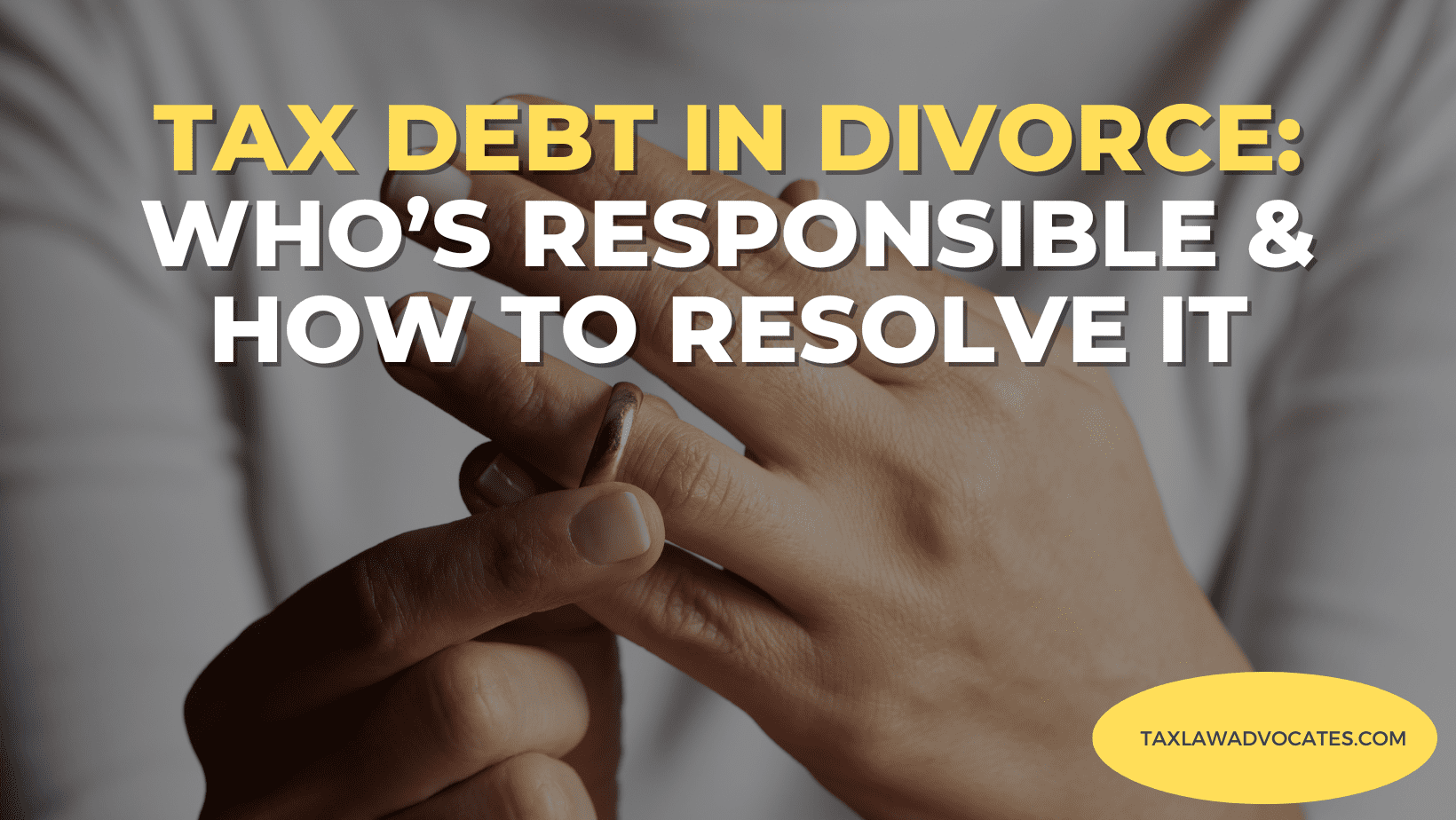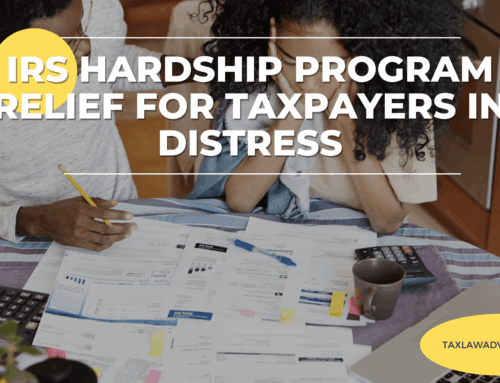Divorce is challenging enough without adding complicated tax issues into the mix. Yet, it’s an all-too-common scenario: a couple parts ways, only to discover they owe back taxes, have pending audits, or must deal with unresolved tax liabilities. When both partners signed that joint return, they often didn’t think they’d be sorting out shared tax debt in the midst of a divorce. But who’s actually on the hook for these unpaid tax bills now that you’re going your separate ways?
In many divorces, dealing with tax debt requires both a level head and a thorough understanding of the rules. You’ll need to know how joint liabilities are handled, how special IRS relief programs can help, and how to minimize your exposure to a former spouse’s unpaid taxes. Let’s break down what happens, how these issues come up, and how you can protect your financial interests—especially when working with a trusted advocate like Tax Law Advocates.
What Happens to Joint Tax Liabilities in a Divorce?
When you file taxes jointly as a married couple, both spouses are generally liable for the full amount of tax due. This concept, known as “joint and several liability,” means the IRS can pursue either spouse—or both—for the entire tax debt. It doesn’t matter whose income triggered the liability or who made the mistake on the return. The burden legally falls on both parties.
But what happens once you decide to divorce? Unfortunately, the divorce decree itself does not override federal tax law. Even if your divorce agreement states one spouse is responsible for the tax debt, the IRS can still legally pursue either spouse for the full amount. Your ex might promise in writing to handle any tax bills, but if they fail to pay, the IRS can come after you.
Why Tax Debt Arises in Divorce
Tax issues often surface during the divorce process for a few reasons:
- Previous Filing Mistakes: Perhaps your former spouse underreported their self-employment income, or you both misunderstood a complex deduction.
- Overlooked Liabilities: Sometimes unpaid taxes from past years go unnoticed until a refund offsets them or a letter from the IRS arrives.
- Change in Filing Status: Post-divorce, you’ll likely file as single or head of household, altering your tax situation. Errors can crop up if you or your spouse tries to claim credits or dependents incorrectly.
- Hidden Income or Assets: One spouse may have kept certain financial activities under wraps, only for them to surface when financial disclosures are made during the divorce proceedings.
Understanding IRS Relief Options
The IRS isn’t insensitive to the predicament many divorced or separated taxpayers face. Several programs allow an “innocent” or “unaware” spouse to seek relief from joint tax debt. Three primary forms of relief might apply to your situation:
- Innocent Spouse Relief: This relief applies if your ex-spouse made errors or omissions you knew nothing about. You must show you didn’t know—and had no reason to know—about the incorrect items on the joint return. If the IRS grants innocent spouse relief, you’re freed from the responsibility of paying the portion of tax that arose due to your former spouse’s misdeeds.
- Separation of Liability Relief: Available if you’re divorced, legally separated, or have lived apart from your spouse for a designated period, this relief allows you to allocate the owed taxes, interest, and penalties between you and your ex-spouse based on what is fairly attributable to each. This can reduce your share of the debt if, for instance, most of the unreported income was your ex’s responsibility.
- Equitable Relief: If you don’t qualify for the first two forms of relief, equitable relief could still help. The IRS looks at the whole picture—your financial situation, any history of abuse, and other factors. If paying the tax your spouse caused would be unfair, you might be granted partial or total relief.
Steps to Protect Yourself from Unfair Responsibility
As soon as tax issues come to light in divorce, you should consider the following steps:
- Review Old Returns Thoroughly: Go back at least three years, and if possible, up to six or more, to identify any discrepancies. Understanding where the problem started helps you figure out how to address it.
- Gather Documentation: Just like documenting assets and debts for the divorce, put together all tax-related records. Keep W-2s, 1099s, K-1s, bank statements, receipts, and correspondence with the IRS. The more evidence you have to show your level of involvement and knowledge of the finances, the better.
- Consult a Professional: Before making decisions, talk to a tax professional or an attorney who understands tax law. Here’s where Tax Law Advocates can come in. With a team of federally-licensed enrolled agents, tax attorneys, and accountants who handle both IRS and state authorities, they can evaluate your case and help you understand your best moves.
- Explore Relief Options: If you believe you qualify for innocent spouse relief or other programs, start the application process early. Gather evidence and complete the required forms thoroughly.
- Negotiate in the Divorce Settlement: Even though your divorce decree won’t override IRS rules, it’s still helpful to negotiate provisions in your divorce settlement that require your ex-spouse to reimburse you for any tax debts that arise. This might not stop the IRS from coming after you, but it gives you legal recourse to pursue your ex for repayment.
How to Resolve the Debt
If the IRS is demanding payment, you have several strategies:
- Installment Agreements: If you don’t qualify for innocent spouse relief, consider a payment plan. If you can’t pay the full amount at once, the IRS installment agreement spreads the debt over a set period. Understanding the terms and negotiating a manageable monthly amount can prevent escalations like liens or levies.
- Offer in Compromise (OIC): If your financial situation is dire, consider an OIC. This allows you to settle your tax debt for less than the total amount owed. However, qualifying can be tough, and the IRS closely examines your assets and ability to pay.
- Currently Not Collectible Status: If paying taxes would create an extreme hardship, you might qualify for currently not collectible status, postponing collection. But remember, interest and penalties continue to accrue, so this is more of a temporary reprieve than a resolution.
- Professional Advocacy: The complexity of determining who owes what in a divorce scenario, coupled with the stress of dealing with the IRS, can be overwhelming. Partnering with Tax Law Advocates can help. They’ll guide you through each step, advising on your best option—whether seeking relief, arranging a payment plan, or negotiating with the IRS on your behalf.
Consequences of Inaction
Ignoring IRS notices or hoping the problem resolves itself is a mistake. Delays can result in:
- Increased Penalties and Interest: The longer you wait, the more it costs.
- Enforced Collection Actions: Liens on your property or levies on your bank accounts can happen if you fail to act.
- Credit Damage: Tax liens become part of your public record and can hamper your ability to secure credit.
- Emotional Toll: The stress of lingering tax issues during or after a divorce is significant, potentially affecting your health and well-being.
Take Action Now
You don’t have to navigate the minefield of tax debt in divorce alone. The rules can be intricate, and the stakes high. Having a knowledgeable advocate can mean the difference between a fast resolution and a never-ending headache.
That’s why reaching out to Tax Law Advocates makes sense. Their team, which includes federally-licensed enrolled agents, tax attorneys, and accountants, stands ready to help you find the right path forward—no matter how complicated your tax situation.
Don’t let tax debt overshadow your fresh start after divorce. Contact Tax Law Advocates at 855-612-7777 or visit taxlawadvocates.com today. Let them help you clarify your responsibilities, take advantage of relief provisions, and create a plan that secures your financial future. There’s no reason to struggle through this process alone—turn to experts who understand your rights and options, and reclaim your peace of mind.






